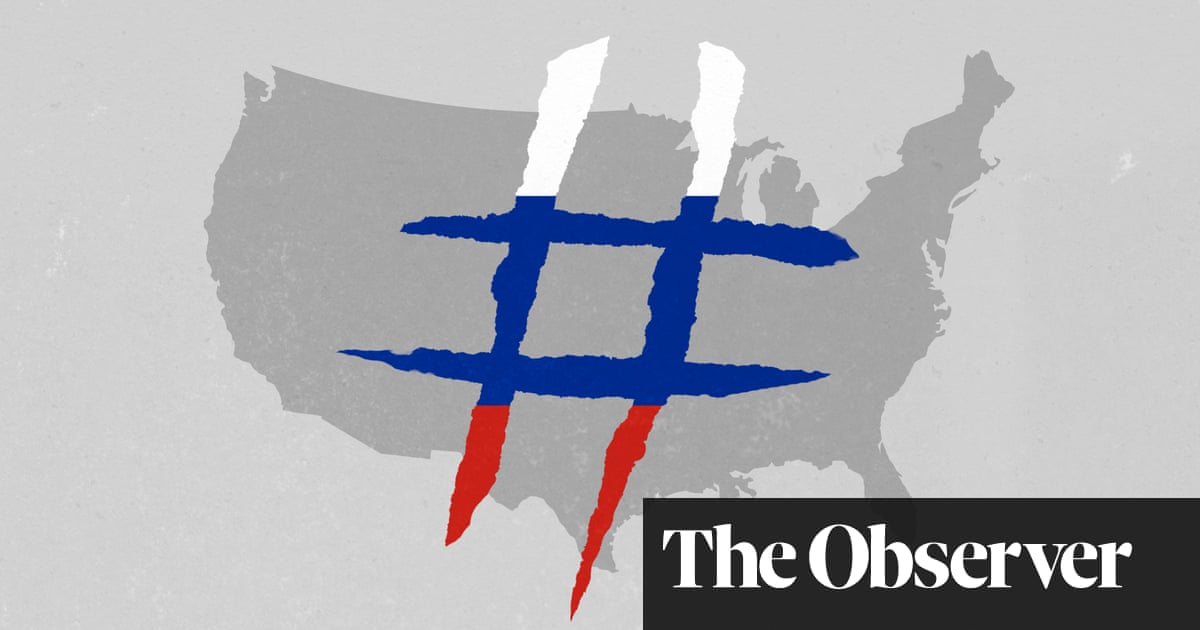
For the past year, the world has reeled over escalating reports of how Russia “hacked” the 2016 US presidential election, by stealing emails from Democrats, attacking voter registration lists and voting machines and running a social media shell game.
Such is the focus on Russian meddling that congressional investigators are increasingly aggressive in asking the big tech companies to account for how their platforms became the staging grounds for an attack on American democracy. Early next month that scrutiny will intensify, with executives from Facebook, Google and Twitter formally invited to appear before the House intelligence committee on Capitol Hill in Washington.
What has now been made clear is that Russian trolls and automated bots not only promoted explicitly pro-Donald Trump messaging, but also used social media to sow social divisions in America by stoking disagreement and division around a plethora of controversial topics such as immigration and Islamophobia.
And, even more pertinently, it is clear that these interventions are continuing as Russian agents stoke division around such recent topics as white supremacist marches and NFL players taking a knee to protest police violence.
The overarching goal, during the election and now, analysts say, is to expand and exploit divisions, attacking the American social fabric where it is most vulnerable, along lines of race, gender, class and creed.
“The broader Russian strategy is pretty clearly about destabilizing the country by focusing on and amplifying existing divisions, rather than supporting any one political party,” said Jonathon Morgan, a former state department adviser on digital responses to terrorism whose company, New Knowledge, analyzes the manipulation of public discourse.
“I think it absolutely continues.”
In the last month – mostly through vigorous reporting and academic research – we have also learned that the impact of Russia’s Facebook infiltration was far more widespread than Mark Zuckerberg claimed when Barack Obama pulled him aside at a conference in Peru last November to inform the young titan he had a problem on his hands. As more evidence emerges revealing the extent of the Russian web invasion, it is clear that its footprint is far larger than the tech giants have ever conceded.
On Facebook alone, Russia-linked imposters had hundreds of millions of interactions with potential voters who believed they were interacting with fellow Americans, according to an estimate by Jonathan Albright of Columbia University’s Tow Center for Digital Journalism, who broke the story wide open with the publication of a trove of searchable data earlier this month.
 Facebook’s chief operating officer, Sheryl Sandberg, and its vice-president of global communications and public policy, Elliot Schrage, on Capitol Hill. Photograph: James Lawler Duggan/Reuters
Facebook’s chief operating officer, Sheryl Sandberg, and its vice-president of global communications and public policy, Elliot Schrage, on Capitol Hill. Photograph: James Lawler Duggan/Reuters
Those interactions may have reinforced the voters’ political views or helped to mold them, thanks to the imposter accounts’ techniques of echoing shrill views and presenting seemingly sympathetic views with counterintuitive, politically leading twists.
During the election, for example, an imposter Facebook page called “Being Patriotic” used hot-button words such as “illegal”, “country” and “American” and phrases such as “illegal alien”, ″Sharia law” and “welfare state”, according to an analysis of Albright’s data by the Associated Press. The page racked up at least 4.4m interactions, peaking between mid-2016 and early 2017.
The urgency of the threat has not been matched by the response of the tech companies, critics say, as they have been slow to acknowledge the problem.
Things happened on our platform that shouldn’t have happened
Sheryl Sandberg, Facebook
A reference to Russia in an April Facebook draft report about election influence was inexplicably cut, the Wall Street Journal reported last week. Only last month did Facebook acknowledge that Russia-linked pages had bought thousands of ads on the platform.
According to the Washington Post this week, Google has detected similar ad-buying activity, of unknown scope, on YouTube, Gmail and its search engine – though the company has made nothing public. The Russian imposters have also been detected on Instagram, Twitter and even Pokémon Go.
Facebook did not reply to repeated requests for comment. But the gravity of the situation, whose dimensions are still unknown, was underscored on Thursday in an interview that Facebook’s chief operating officer, Sheryl Sandberg, gave to Axios.
“Things happened on our platform that shouldn’t have happened,” Sandberg said, adding that the company owed the American public “not just an apology, but determination” to address the problem.
The attackers appear to have a handy, if unwitting, ally in Trump, who is generous in spreading bile online. In certain recent cases, social media accounts linked with Russian influence operations appear to have taken cues directly and immediately from the @realdonaldtrump Twitter account, according to analysis by the Washington-based Alliance for Securing Democracy, which maintains a daily tracker of the networks in question.
After Trump criticized the “poor leadership ability” of Carmen Yulín Cruz, mayor of San Juan, Puerto Rico, on 30 September, for example, Russian-linked Twitter accounts disseminated articles with “the primary theme of either discrediting” Cruz “or accusing the media of spreading ‘fake news’”, the alliance said.
The week before that, the clandestine network poured accelerant on the fight picked by Trump with the mostly African American players in the NFL who kneeled during the national anthem in protest of police violence. Instead of simply echoing the president’s demand for a boycott unless the players stood, however, the Russian accounts took both sides of the issue, spreading both the hashtags #TakeaKnee and #BoycottNFL.
There’s some really intricate maneuvering going on
Jonathan Albright, Columbia University
“The ads and accounts appeared to focus on amplifying divisive social and political messages across the ideological spectrum – touching on topics from LGBT matters to race issues to immigration to gun rights,” said Alex Stamos, the chief security officer at Facebook, in the first public statement the company made on the matter.
Albright’s data encompasses six Facebook pages previously linked by media investigations to Russia. The pages were not clumsily partisan, pro-Trump or anti-Hillary Clinton sites. Instead they worked by crafting identities around hot-button issues in US politics, and by wielding a crafty sympathy, in some cases, with causes seen as antithetical to Trump such as LGBTQ pride and opposing police violence.
“There’s some really intricate maneuvering going on,” said Albright. “It’s definitely set up not to directly force issues but to identify people that fall into the wedge categories that can be used to influence others or to push conversations elsewhere.”
The imposter pages included Secured Borders, an anti-immigrant account that grew to 133,000 followers; Texas Rebels, which parroted Lone Star state pride while criticizing Clinton; Being Patriotic, which attacked refugees while defending the Confederate battle flag; LGBT United, which subtly espoused “traditional” family values; and Blacktivists, a faux satellite of the Black Lives Matter movement.
“It seems Americans should be wary of police brutality more than of Isis terrorists,” read a typical Blacktivists post, which was liked thousands of times.
 Donald Trump shakes hands with San Juan’s mayor, Carmen Yulín Cruz. After he criticized Cruz on Twitter, Russian-linked Twitter accounts disseminated articles focused on discrediting her, analysts say. Photograph: Evan Vucci/AP
Donald Trump shakes hands with San Juan’s mayor, Carmen Yulín Cruz. After he criticized Cruz on Twitter, Russian-linked Twitter accounts disseminated articles focused on discrediting her, analysts say. Photograph: Evan Vucci/AP
“Why there’s so many privileges and benefits for refugee kids, but American kids forced to grow up in poverty?” asked one September 2016 post by Secured Borders. “That’s absolutely unacceptable!!”
“More than 300,000 vets died awaiting care,” read a post on Being Patriotic. “Do liberals still think it is better to accept thousands Syrian refugees than to help our veterans?”
Owners of the imposter pages could post controversial – or seemingly sympathetic – messages or event announcements, and then, by inviting and observing interactions such as “likes”, comments or merely views, gather information about genuine American Facebook users, and potential voters. Those voters could then be targeted with political content that appealed to some of their most closely held sympathies.
The strategy was highly effective, in terms of penetration. Albright’s research showed that the six Russia-linked Facebook pages had generated more than 18m interactions – a conservative estimate, he said – before Facebook shut them down.
But those were just six accounts among “dozens and dozens and dozens of pages” that bore obvious markings shared by other accounts linked with Russia, said Albright.
“Those 18m interactions are only for those six pages, just on Facebook” and not Instagram or other social media, Albright said. “So what are we talking about here, overall? We’re talking about hundreds of millions of interactions.”
The accounts and others have since been removed by Facebook. But “I don’t think they’ve even begun to find” all the imposter accounts, Albright said, owing to the imposters’ verisimilitude.
Morgan, the former state department adviser, called the response so far by the big tech companies to the Russian presence on their platforms a “misfire”.
“What I see is Facebook and Twitter and Google trying to define this problem narrowly as about political advertising, and I think that that misses the mark,” he said. “Because the next group of people that are going to be vulnerable is American industry, especially industry that’s foundational to how our society operates. So the energy industry and the financial industry – they can be manipulated just like our electoral process.
“I think a narrow focus on political advertising is ultimately going to miss the forest for the trees.”
Albright agreed that “there needs to be some kind of oversight”.
“It doesn’t fall completely on Facebook,” he said. “The scale at which this is happening is concerning enough that something needs to happen. We need to rethink a lot of this, because it’s definitely not working.”
Everyone in the know, from the bipartisan heads of the Senate intelligence committee on down, agrees with the researchers, that more pressure needs to be applied at every level, in the tech world and in Moscow, to figure out what happened and what is still happening.
Everyone, with one notable exception.

